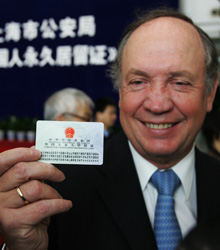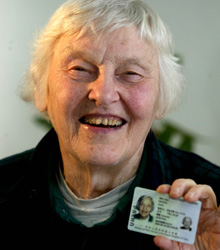|
 |
 |
|
NEW IDENTITY: Peter Borger, General Manager of Siemens China, shows off his Chinese permanent residence permit after receiving it in Shanghai on April 12, 2005 (CHEN YANG) |
RECOGNIZED CONTRIBUTIONS: American citizen Joan Hinton receives her Chinese green card, one of the very first, on September 21, 2004 (CNSPHOTO) |
After living in Beijing for more than a decade, Elyse Ribbons, who grew up in Detroit, Michigan, considers herself a true Beijinger. Ribbons, who speaks fluent Mandarin, founded a theater company in Beijing in 2007 and is also a playwright, radio talk show hostess and actress.
Ribbons was excited to learn that China is considering lowering the requirements for permanent resident status.
"It used to be very hard to get a permit. My impression is that the policy favored people with a lot of money to invest. If there is a change of policy, I will definitely apply for one myself," Ribbons, 34, told newspaper International Herald Leader, a Beijing-based newspaper.
Xinhua News Agency reported in early June that authorities have been discussing changes to the regulations on granting permanent residence by decreasing the requirements for eligibility.
Slow progress
China first introduced permanent residence status for foreigners in the Law on the Control of the Entry and Exit of Aliens, which was enacted in November 1985.
In 1986, Werner Gerich, a German who served as manager of the Wuhan Diesel Engine Plant in Hubei Province and the first foreign company manager in China after 1949, became the first foreigner to be granted permanent residence status in China.
China began issuing permanent residency permits, sometimes colloquially referred to as Chinese green cards, in 2004. According to the Regulations on Examination and Approval of Permanent Residence for Foreigners, which was promulgated by the Ministry of Foreign Affairs that year, permanent residence is primarily open to foreign investors who have made sizable investment in China, high-level business executives, prestigious scholars and other persons who have made outstanding contributions or are of special importance to China, as well as people who have come to China to join their families.
In recent years, fast-track permits have been granted to participants in China's global headhunting campaign, the Recruitment Program of Global Experts. Launched in December 2008, the program was designed to recruit 2,000 top-notch scientists and other professionals of any nationality over the next five to 10 years.
By the end of this May, the program and its seven sub-programs had recruited more than 4,180 elite scholars, business executives and entrepreneurs. The Chinese Government has issued several regulations to ensure the success of the strategy. According to the regulations, on top of large grants and other benefits from the Chinese Government, innovative scientists and entrepreneurs and their families are also entitled to favorable treatment in obtaining visas and residence permits to help with their international travels.
A total of 1,306 green cards have been issued to this group of people, which fall under the category of people making special contributions to the country. And the number could be higher if the preferential policies in obtaining Chinese green cards had been better publicized.
The relatively high requirements have kept most foreigners from even applying for the permanent residence in China. Newspaper People's Daily reported on June 2 that 4,976 foreigners had obtained permits to date, averaging less than 500 issued annually.
Permit-holders come from a total 91 countries and regions, with the United States, Japan, Canada, Australia and Germany topping the list of countries of origin. Investor-applicants and their families are the smallest group with only 94 successful candidates. High-level business executives and prestigious scholars, along with their families, obtained a total of 763 green cards. Altogether 1,612 cards were given to foreigners making outstanding contributions to China and their families.
One of the first permanent residence permits was issued to Joan Hinton (1921-2010), known as Han Chun in China, who was one of the few female scientists to take part in the Manhattan project, which resulted in the first atomic bomb. When receiving the card in 2004, the 83-year-old had been living in China for 56 years, time she devoted to improving the country's dairy farm automation technologies.
It is stipulated that holders of a permanent residence permit enjoy the same rights as Chinese citizens during their stay in China, except for political rights and those otherwise explicitly mentioned in laws and regulations. For example, the permit holders can apply to join social security plans, board airliners and apply for a driving license in China.
As one of the earliest Turkish students sent to China on a government scholarship, Noyan Rona has lived in China for 32 years. Besides working as the chief representative of Garanti Bank's Shanghai office, Rona spent a lot of time doing volunteer work for local communities and care homes. After becoming an honorary citizen of Shanghai in 2012, Rona received his permit in 2013.
In addition to reducing the requirements for permanent residence permits, he added there should be improvements for foreigners who do get the cards.
"I have a permit, but I cannot enjoy the services as easily as native Chinese citizens," he said, citing an example from when he wanted to open a bank account.
"They did not recognize my permit, and insisted on a passport," he said, adding that he encountered similar problems in hospitals and with other service agencies.
Dutch banker Piter De Jong, who heads the Shanghai operations of ING Bank NV and has lived in Shanghai for 16 years, received a Chinese green card in 2012. He experienced similar difficulty in using this card in hotels and banks and ended up having to present his passport to prove his identity.
"I hope that the green card will be widely recognized and get holders the services it promises. Otherwise, why would anyone bother to apply for a green card?" De Jong said.
| 